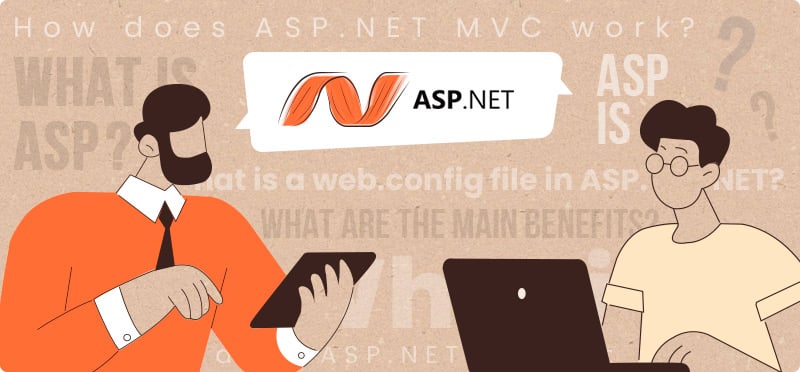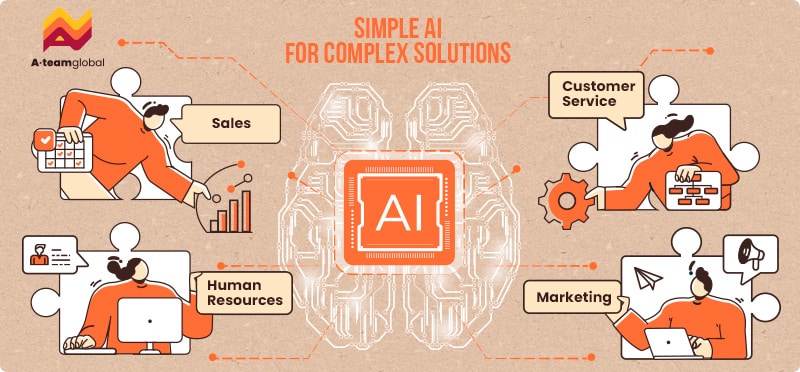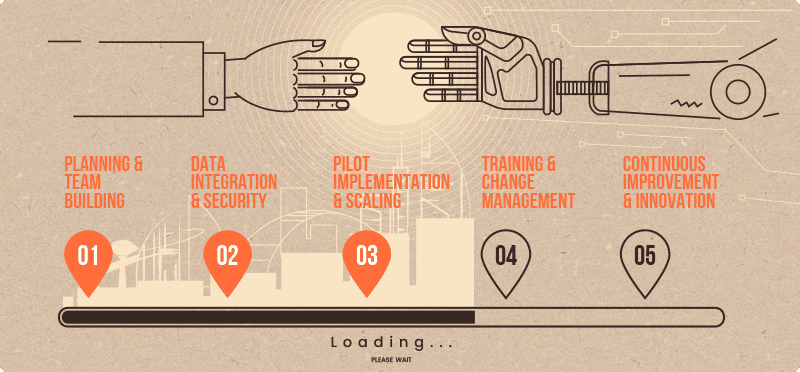
What Makes a Great ASP.NET Developer?
Before proceeding with ASP.NET interview questions, there is a great sense in finding out what makes a great ASP. NET developer and what skills, features, and traits should they have to perfectly fit your team and contribute to your project development.
- Strong technical expertise. Indeed, technical knowledge and top-notch skills in ASP.NET is the main feature that makes a good developer, even regardless of the technology used. However, it isn’t the only characteristic that’s important for making the right choice for your project.
- Semi-niche experience. A perfect-fitting ASP.NET candidate should have the development experience with creating the solutions for your or a closely related niche. Choosing such a candidate will allow you to reuse the best development approaches already tested in your niche, plus it will take less time for a candidate to onboard and plunge into your project specifics.
- Willingness to learn. This is a must-have trait for every specialist working in the IT field. Make sure the candidate is open-minded and stays tuned into the innovations and updates to keep pace with the times and offer the latest advancements for your development process.
- The skill to accept their own mistakes and fix them. This is another must-have characteristic that makes innovation developers drive to progress further. Writing the code without mistakes is almost impossible so the skill to accept, analyze and fix the mistakes becomes crucial. You can evaluate this trait of a candidate by asking them personal interview questions for ASP.NET we will share in the following section.
- Communication skills. The skill to clearly communicate with the team and the customer is also an important trait of an ASP.NET developer. Gathering a team of collaborative developers able to communicate with each other clearly is half the battle to avoid costly mistakes and achieve mutual understanding.
ASP.NET Core Interview Questions - How to Interview ASP.NET Developers in 3 Stages
The process of candidate recruitment takes place in several stages. As mentioned, the process of candidate interviewing is one of the most important tasks since the interview results allow you to make sure the chosen candidates are tech-savvy enough to create your project, avoid possible pitfalls, risks, and extra costs, plus maintain your solution at such a development level that the users will have no complaints on its quality.
The process of ASP.NET developers’ interviewing consists of three stages, so let’s move step by step towards making effective hiring decisions.
Stage #1 - Preparing for an interview
Before proceeding with ASP.NET interview questions, you have to take some preparatory steps. Firstly, devote some time to understanding the technology itself and its specifics. Next, move on to preparing for the interview itself.
ASP.NET is a part of the Microsoft ecosystem; this is an open-source web development framework that allows for creating cross-platform apps. It can be a good choice for interactive and data-driven solutions.
Gather a pool of candidates
The simplest way to do it is to post your vacancy on local job boards and use LinkedIn to connect to the tech talents. Then, collect the candidate’s resumes and proceed with their analysis.
After analysing all the CVs collected, shortlist your candidates. You have to shortlist the job-seekers based on their hands-on experience and projects they have worked on.
Define how many developers you have to hire
Also, take a sober look at your project scope and determine how large your development team should be, as hiring employees in-house has a certain limitation - you can choose from the local tech pool only. That’s why you may face talent lack if your project requirements are pretty specific. However, it isn’t the reason to abandon or delay your application development. In the case of a local tech talent shortage, you can always extend your in-house team with remote developers.
Contact us for team extension help!
Stage #2 - ASP. NET interview question and answer
Now, let’s move to the most important part of the interviewing process - the candidate interview itself. To come up with a complete impression of the candidate’s knowledge, skills, background, expectations, and personal traits, it is better to divide ASP NET Core interview questions and answers into three logical sections.
ASP NET interview questions
Since the technical expertise of the candidate is the most important and decisive factor, it makes sense to start the conversation with an ASP.NET interview test and proceed with technical interview questions for an ASP.NET developer. Below are the must-ask ones:
1.What is ASP?
ASP is an Active Server Page - the concept developed by Microsoft to allow programmers to create dynamic websites.
2. What is the difference between ASP. NET and .NET?
.NET is a development platform, while ASP.NET is a framework.
3. What are the main benefits of .Net over other languages?
There are several significant benefits of .Net over other languages. When used right, it becomes a cost-effective technology capable of covering multiple use cases and perfectly compatible with main platforms. This programming tool is also pretty flexible, and the apps created with it are easy to maintain. Net also comes with Visual Studio IDE, plus it is an object-oriented programming language.
Compared to some other programming languages and from personal experience, .NET requires less coding, and therefore, streamlines the development process. It can also boast of some little customized features the developers can instantly reuse, and this is one of the languages that promote better security, flexibility and scalability. Being supported by Miscrosof, this programming language is one of the ever-green ones; it has a large toolkit, supportive community and multiple use cases.
4. What types of apps can we develop using ASP.NET? Name popular websites written with it.
As for this interview question, ASP.NET is best suitable for web services and dynamic content-driven web pages. It is also frequently used in the gamification industry. For example, Stack Overflow and GoDaddy websites are created with this technology. When handled by experienced developers, this technology also allows for creating apps for the Internet of Things, mobile backends, and hybrid mobile apps. That’s why this is one of the versatile technologies that can be used to create the software planned to be executed on server environments especially.
5. What is a web.config file in ASP.NET?
This is an XML file used to configure the website pages.
6. How does ASP.NET MVC work?
MVC (Model-View-Controller) pattern works in ASP.NET as follows: User interacts with the View, View alerts the Controller of a particular event, Controller updates the Model, Model alerts View that it has changed, View receives Model data and updates it.
7. What operating system ASP.NET applications are compatible with?
Since ASP.NET apps are cross-platform, they are compatible with Linux, Windows, macOS, and Docker.
Below are some of the ASP NET interview questions and answers for experienced developers.
8. What are ASP.NET Web Pages? Do they differ from web forms?
ASP.NET Web Pages is a dedicated framework allowing users to create dynamic websites. ASP.NET Web Forms are the platform supported by ASP.NET.
9. How does ASP.NET Web Forms differ from MVC?
There are several essential differences between Web Forms and MVC. In MVC, there is no fixed code behind each page for each view. Web Forms, in turn, are directly driven by the code behind each of the pages. MVC requests a controller, while a Web Form requests a view, and only then, access the code. You have server control for everything in Web Forms, while this feature is optional in MVC.
There is no View state for state management in MVC, while in Web Forms, Viewstate is used to maintain a state of form in the view which makes a page heavy.
10. What are the various validators in ASP.NET?
This is one of the ASP.NET experienced interview questions, so it makes sense to define validators first. The main task of validators in ASP.NET is to make sure there is no unauthenticated, or contradictory data stored. As for the validators examples, there are:
- RequiredFieldValidator
- RangeValidator
- CompareValidator
- Regular Expression Validator
- CustomValidator
- ValidationSummary
To explain some of them, the Required Field Validator, as the name suggests, is a validator that ensures the user has filled all the necessary fields to log in or sign up or make a more complicated and more sticky authorized action on the website. A range validator is the one that helps with making sure that the input is within the allowed range, depending on the Minimum and Maximum value properties.
11. What are the best ASP.NET use cases?
ASP.NET is mostly used to create cross-platform websites and services, plus dynamic content apps.
12. What limitations does the technology have and what can you suggest for overcoming them?
This technology is expensive compared to other competitive tools, and sometimes it lacks security. The correct way to overcome these limitations is to carefully validate the core idea to use ASP.NET for the project.
Practical ASP.NET interview questions
What questions should you ask a .NET developer to make sure their experience matches your project specifics and reusing their skills will be beneficial for your development process? Below are some ideas
- Review the candidate’s portfolio and highlight projects from the same industry as yours. Then, ask to briefly tell about each of them to catch the applicant’s background and make sure the candidate is well-versed in the industry.
- Stop on the specific project from the portfolio and ask some questions in more detail. For example, you can ask the candidate to tell you about the project scope, timeline, task management tools used, the development methodology, and team collaboration practices.
- Ask about challenges related to the project. Technical challenges the candidate knows how to overcome are the most valuable skills. Ask them to tell more about the project pitfalls and how they have overcome them. The answer to this question will also allow you to evaluate the candidate’s analytical, critical and creative thinking.
- Ask about the failed projects, if any. Focusing on successful cases in the process of interview is important, but asking about failures also makes sense. Firstly, it will allow you to understand the candidate's experience even better, and secondly, this is an opportunity to find out how job-seekers cope with failures on a personal level.
Personal interview questions for ASP.NET developer
The best ASP.NET interview questions are those that cover not only technical knowledge and practical experience but that also allow you to get an impression of a candidate as a personality as well. Personal traits of your future developers are important for building a compatible and effective team that will work on your project in a healthy and collaborative environment. Here is what you should ask to make sure the candidate fits your company, plus some suggestions on the answers you can hear from them.
1. What were things you valued the most at your previous workplaces?
“I highly valued the collaborative environment we had. Our Project Manager did their best to ensure each team member feels themselves on their plate. It was also very convenient to have a flexible schedule, mixing work from the office with work from home. ”
2. What, in your opinion, makes a development team effective?
“The ability to clearly communicate, delegate the tasks in a smart way, and the feeling of belonging to the common goal make a development team effective, in my opinion. I’m also sure that the team should be gathered in such a way so that the core hard and soft skills of each of the members complement and balance each other, creating a well-working unit when combined together.”
3. What are the things the Team Lead should never do?
“In my opinion, the Team Lead should never think their suggestions, ideas, and decisions are the only right ones. They should also never look down on their team. Instead, they should be here to do the common job with their team.”
4. Have you ever explained the project’s errors to the customer? Share this experience, if you don’t mind.
“Yes, I had faced such a situation. However, when the mistake is already made, there is no other way than to admit it, apologize for it, and suggest a way to fix it asap. This was just the strategy I have followed. ”
5. What is the key to the project’s success, proceeding from your experience?
“There are several keys to the project’s success, and not all of them are related to technical knowledge and skills. From my experience, only those projects that have a clear vision, measurable goals, and a well-gathered team behind have a chance to succeed. What’s more, the team should always be ready for changes and challenges, taking them as an opportunity to develop, learn and create something even more outstanding.”
6. Tell me a difficult situation you have overcome in the workplace?
“I had faced several difficult situations. Once upon a time, we have failed all the possible and impossible deadlines because the Software Requirements Specifications were too vague. We had to spend too much time discussing them again and again until we got clear on the customer’s expectations. Next, we decided to update the customer more frequently so that each of us is sure that we all are on the right way.”
Keep in mind that the answers to these interview questions on ASP.NET will always be individual, and that’s why there is no templated suggestion on the right answer. When asking the candidate personal but still ASP.NET basic interview questions, keep an eye on how they respond and communicate, what feedback they share on the companies they have worked with previously, and how willing they are to answer and continue the conversation.
Perfectly, the answers to the personal ASP.NET basic interview questions should highlight the candidate’s positive attitude to both your company and ex-workplaces, plus showcase them as responsible, open-minded, collaborative, and supportive professionals willing to share their expertise for the benefit of your project.
Stage #3 - Analyzing interview results
After you are done with ASP.NET programming questions and answers, it’s time to analyze the results. Indeed, the perfect-fit candidate should be excellent at a technical interview, they should have clear answers to those questions we have shortlisted and beyond. They should also have niche-relevant experience so that you can reuse specific expertise during your project development. Lastly, there should be cultural and personal fit, plus the candidate’s inner values should match your company’s core principles and ethics.
Is There an Easier Way to Hire ASP.NET Developers?
The hiring process of tech talents has never been easy. There are a lot of possible challenges to face and solve - starting with the talent shortage (even despite their seeming abundance) and ending with the personal fit. The process of hiring in-house can also be costly, especially for small and medium businesses, plus taking the right hiring decisions that will be paid off in the future requires experience, critical thinking, and sometimes even a sharp intuition.
So, is there an easier way to hire an ASP.NET developer? As an alternative strategy to hiring experts in-house, searching, shortlisting, interviewing, and onboarding on your own, consider getting in touch with a remote and ready-made development team. Depending on your project goal and current need, you can either partner with a dedicated team hiring them from a development vendor, or let the latter assist you with scaling and extending your in-house team.
Hire ASP.NET Developers at A-Team Global
A-Team Global can help you with hiring ASP.NET developers as fast as possible, meeting your project scope, needs, timelines, budget, and requirements. We can suggest the best candidates we already have in our team, and perfectly match their individual skills with your project’s specifics. Depending on your business goals, you are welcome to outsource your software development in full or scale your in-house team with ASP.NET developers remotely. Both strategies are equally winning, as they allow for saving getting-started time and avoiding in-house hiring costs and pitfalls.
Conclusion
Sometimes, the process of hiring the necessary talents can significantly delay the development start. On average, it takes one month to close the vacancy, but considering the special skills and competencies some projects require, it can take even longer.
As for the process of ASP.NET developers interviewing, there are a lot of questions you have to ask, plus tailoring them to the candidate’s experience and your project specifics. To speed up the process of hiring and interviewing, consider hiring a dedicated development team or scaling your in-house one with remote programmers.
you may also want to read

Leveraging Local LLMs and Secure Environments to Protect Sensitive Information
In the rapidly evolving digital landscape, businesses are increasingly adopting Generative AI (GenAI) technologies to stay competitive and innovate. Large...

Boost Efficiency Today: Easy AI Integration for Immediate Results
In the past, the idea of integrating artificial intelligence into your business might have felt like venturing into uncharted territory—complex,...

A Roadmap to Gen AI Adoption for Small and Medium Businesses
Unlock new opportunities by integrating Generative AI into your business operations. In today’s fast-paced digital landscape, small and medium businesses...
